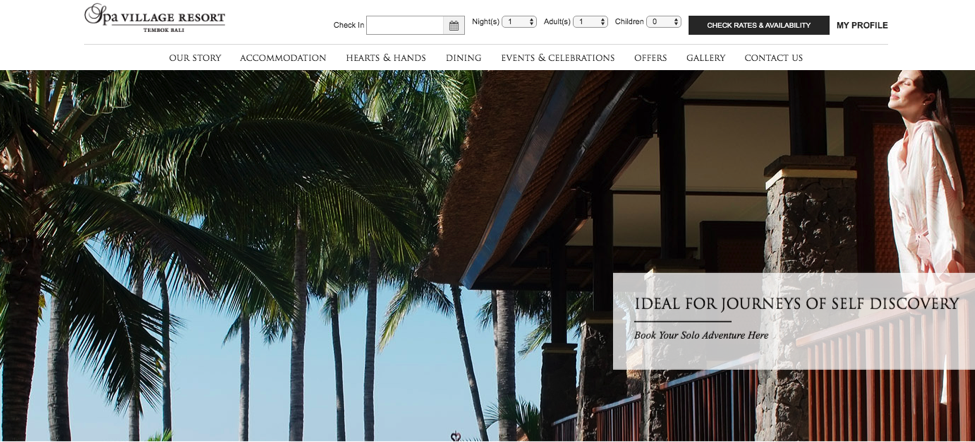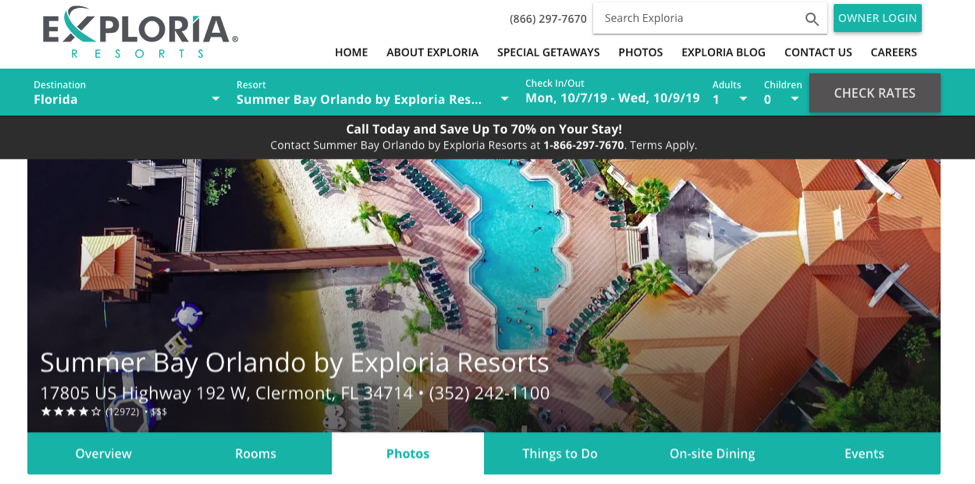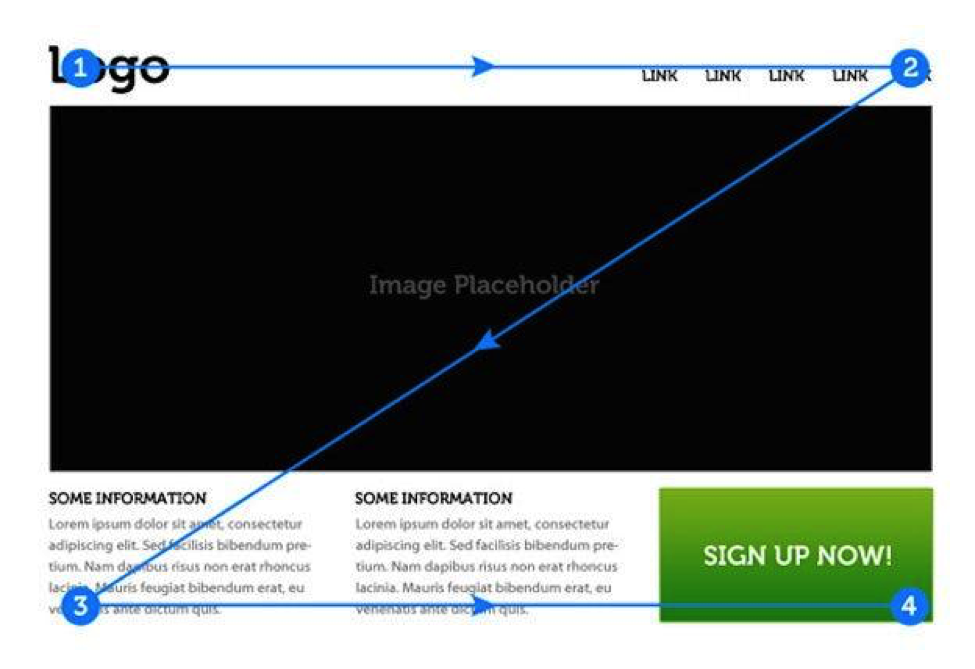
It’s time for some straight talk. An un-optimized website could be costing you hundreds of thousands of dollars when it comes to snagging vacationers on the lookout for great accommodations.
People expect big things from the hospitality industry today. With review platforms and large booking sites determining how most people pick their vacation lodgings, hospitality businesses need exemplary websites now more than ever before.
Could your hotel’s website be holding back your ability to maximize revenue?
Here are some signs that your website might be outdated, unattractive, and underperforming when it comes to enticing potential guests.
Is Your Outdated Appearance Turning People Away?
When someone walks into your establishment, you want a setting that gives guests the “WOW” factor. Your website should do the same thing!
In the hospitality industry, first impressions are everything - both online and off.
Think about it. If you walked into a hotel and the lobby looked seedy, unorganized, and had a sketchy vibe to it, would you want to give them your hard-earned money to stay there? Probably not.
The same concept applies to your website.
Stale content, bland images, and old information are glaring red flags for most users.
According to Blue Corona’s research, roughly 38 percent of people will stop engaging with a website simply because the content or layout is unattractive. Another 38 percent of people cited a website’s design as the number one factor in deciding the credibility of a business.
Look at the designs of these two websites:
 Image Source: Casa del Sol Machupicchu
Image Source: Casa del Sol Machupicchu
 Image Source: Hotel Terraza Deluna
Image Source: Hotel Terraza Deluna
Both are located in the same town in Peru, but which one do you think people are going to trust and give their credit card information to?
The top one looks relatively new, neat, and clean. The other looks like it was created many years ago and never updated, with squashed photos and clip-art designs.
This is where a hospitality marketing agency would step in and tell the second website owners that they’re losing potential customers. People are certainly turned away by low-quality graphics, and the outdated appearance isn’t doing the business any favors.
The Benefits of Updating Your Content and Website’s Appearance
With the help of a digital creative agency, you can ensure that your website and its content stay up-to-par with consumer expectations. Regularly updating your website ensures that visitors can find answers to their questions and give them the buyer’s confidence they need to finish their booking.
Some of the overarching benefits of keeping your website up-to-date include:
- Ability to capture more customer information
- More bookings
- Faster bookings
- Stronger ability to create customer loyalty
The more you update your website, the more you’ll ensure that it’s user-friendly. Don’t hesitate to get your website audited to determine where you can improve the interface, information, and opportunities for customer engagement.
Trends in Travel and Hospitality Web Design
Because travel and hospitality trends are constantly evolving, your web design must evolve in tandem.
For example, a recent survey by Lodging Magazine found that more than half (52 percent) of bookers have expressed interest in touring hotels in AR or VR. Have you looked into these? If not, it might be time to check them out!
Some other findings the survey indicated were vital to modern consumers are:
- Access of high-quality WiFi (advertised on the website)
- Check-in options on smart devices
- Ability to order room service and housekeeping
Don’t just acknowledge these changes in the hotel industry - jump on them. Highlight them on your webpage and show that your business is on top of the changing hospitality trends.
Keeping Up With Necessities in the World of SEO
Another benefit that comes with updating your webpage is improving its online search presence. Any digital creative agency worth its weight will prioritize design trends that assist with your SEO. A website that is compatible with trends in SEO is likely to draw more traffic and appear on relevant Google searches.
Does Your Website Appeal to You or the Guest?
Perhaps the biggest sin a business can commit is creating a website that appeals to the business, not the user.
Now, what exactly does this mean?
Truth be told, this can mean a lot of different things.
To give you an example, it might seem like a good plan to collect as much information from your customers as possible for CRM. Maybe this includes creating an account, filling in their name, gender, phone number, email, home address, work address, credit card information, etc.
From a business perspective, having all this data for every customer is valuable. However, most website visitors don’t want to take the time to enter in this laundry list of information. If your website requires them to take all these steps, this is a perfect example of a website made to serve the business, not the customers.
In reality, having visitors fill in their name, email address, and credit card information (if there is a transaction) would likely suffice. To go a step further, you could offer quick pay options like Apple Pay, PayPal, Google Pay, and so on to make things easier for the user.
Nowadays, hotel websites aren’t just battling other hotels - they’re also working to separate themselves from mass booking websites like Expedia, Kayak, and TripAdvisor. Therefore, the question all business owners in the hospitality industry must ask themselves is, “What makes your website better than the big booking sites?”
In most cases, it comes down to the ability to sell a story and experience that differentiates hotel websites from run-of-the-mill booking sites. You need to present your hotel brand identity in a way that appeals to users and connects with them on a personal level, as opposed to purely serving your business interests.
This story can’t just appeal to you and your experience with the hotel. It needs to prioritize what consumers are looking for in order to snatch them away from the OTAs.
Methods for Appealing to Different Kinds of Vacationers
When working with any hotel marketing company, you’ll quickly realize that they orient their strategies around consumer target groups. Don’t assume that every kind of vacationer is looking for the same thing, and learn to appeal to different consumers based on various defining traits.
For example, if you run a romantic, high-end resort that doesn’t allow children, you probably won’t market to families or business travelers. Everything about your website should appeal to solo travelers or couples without kids who are looking for an opportunity to relax and indulge.
 Image Source: Spa Village Resort
Image Source: Spa Village Resort
On the flip side, if you’re featuring a hotel that’s in Orlando, Florida, you might want to target the millions of families that come to enjoy theme parks. Therefore, your marketing strategy and website feel should be entirely different to snag the right kind of consumer.
 Image Source: Exploria Resort
Image Source: Exploria Resort
Before you make any big design changes on your website, ask yourself, “Who am I trying to appeal to? What story do I need to tell?”
You might be trying to appeal to ALL sorts of guests - from solo travelers, to couples, to families, to business executives. Regardless of who your target guests are, your website needs to be created in a way that appeals to all of them.
Are Disconnections in the Visual Hierarchy Bothering Your Users?
What’s visual hierarchy?
In its simplest sense, it’s the order in which a user unconsciously processes information while first looking at your website’s page.
The human brain generally scans websites in a Z-shaped pattern.
 Image Source: 99 Designs
Image Source: 99 Designs
If you look at most websites, you’ll notice the design is built around the concept above.
When people visit a hotel’s website, hospitality marketing agencies know that their eyes naturally follow a particular pattern. They’ll usually scan the top of the page, then look at the main images, then find their way down to the bottom of what they can see. This forms the “Z” shape, and if you’re not playing on the pattern, you might be losing out on customer attention.
Keep basic information, such as search bars and contact links, at the top of the page where the visitor first looks. Then, snag the viewer’s attention with a large, high-quality image or feature in the middle of the page.
Finish up your visual hierarchy with a “booking” image or link that’s impossible to miss, as well as some tidbits of helpful information.
Are You Watching for Snags in Booking Transactions?
When people are ready to book with your website, they’re likely sitting with their credit card in hand, ready to pull the trigger. Your website’s job is to act on their readiness and snag the conversion as quickly and easily as possible.
Unfortunately, many websites don’t simplify their booking process. They ask too many questions, such as “do you want a rental car?” or personal queries such as your title, gender, etc.
Always remember, consumers these days have more options at their fingertips than ever before (literally!) Every single step in your booking process is an opportunity for them to reconsider their decision!
Additionally, many consumers balk at any lack of transparency on hotel websites. No one wants to go through the entire checkout process only to find that there are tacked-on fees, taxes, and expenses that they didn’t anticipate. If your complicated checkout didn’t send them running, hidden prices almost certainly will!
Perhaps the best hotel marketing strategy is to make your transaction process as painless as possible. If it takes more than a minute or two for someone to book a room with your hotel on your website, they’ll likely feel annoyed at the hiccup.
Are Vacationers Stumbling Through Complicated Forms?
We briefly touched on this earlier; however, unnecessarily complicated forms are a HUGE form of friction that can send guests running into the arms of your competition. If people are running into complex forms and requests on your webpage, they’ll likely seek out an easier booking option.
Let’s say that someone wants to ask a simple question about your accommodations. They shouldn’t have to provide tons of personal information and fill out a massive form just to get in contact with someone who can handle their queries.
Make sure that vacationers feel at ease and can use your website with limited complications. The fewer forms and steps you can have, the better. Stick to the essentials!
Have You Created a Sense of Community?
In addition to a loyalty program, it’s a great idea to leverage user-generated content (UGC).
UGC is content created by everyday people that advertises your business. It’s a vastly beneficial trend in the hospitality industry these days - people tend to be more open to marketing messages if it’s coming from their peers, as opposed to a business.
Another bonus is that leveraging the UGC trend is cheap as well as extremely effective. Let’s discuss some of the top low-cost tactics you can use to maximize the effect of your users and their content.
Creating a Branded Hashtag
When buffing up digital marketing for hotels, any agency knows that it’s important to embrace the hotel’s uniqueness. That’s where a one-of-a-kind hashtag comes into play.
For example, The Catamaran Hotel in San Diego uses the hashtag #ExploreCatamaran
When guests tag their Instagram posts with this hashtag, it creates a piece of UGC that promotes a first-hand experience at the resort.
Not only does creating a special hashtag for your hotel encourage users to create content, but it also sets your website and business presence apart from others. Make your hashtag public and give people reasons to want to feature your brand on their social media profiles.
Hosting a Giveaway
A great trick used in lead generation for hotels is the time-tested giveaway strategy.
Nothing gets users talking more than the opportunity to win a free stay, a discount, or some kind of reward. Orient your giveaway around consumer-created content and make people earn their entry in a way that benefits your marketing strategy.
This approach may not always be feasible. You need to closely examine how a giveaway can benefit the business in the long term. Maybe this translates to more leads, online visibility, or more brand mentions.
Giving People the Chance to Be Featured
A good hotel marketing company will tell you that the average consumer loves seeing their own content shared by businesses. If you give people the opportunity to see their pictures or reviews posted on your website or social media page, you’ll probably spark some of that UGC we mentioned earlier.
A Checklist for Your Hotel’s Website in 2020
Let’s talk about the different features your hotel’s website needs to have to survive in the foreseeable future.
High-Quality Photo Galleries
A recent TripAdvisor study emphasized the importance of quality and quantity when it comes to photos of hotels: those with 20 or more high-quality images tend to receive 150 percent more traveler engagement. No matter what hotel marketing ideas you may have, they should all start with great, engaging photos.
If you can, try to steer away from stock images - as these won’t do much to differentiate yourself.
Original Custom Content
As we mentioned earlier, your hotel’s website needs to appeal to people with a story. That’s where local features and lifestyle marketing come into play. With original, custom-made content, you can reveal to people what makes your hotel special and why they should choose yours over another.
Keep in mind that “original” content comes in various forms. Try your hand at all of them, from custom social media posts to photos, blogs, videos, interviews, etc.
A Mobile-Friendly Design
According to Criteo’s Summer Travel Report, hotel’s receive over 70 percent of their last-minute bookings via mobile devices. Any digital creative agency will tell you that having a mobile-friendly design isn’t just beneficial - it’s essential.
A List of All the Amenities
A big flaw in the common hotel marketing strategy is the failure to highlight the amenities properly. Don't assume that your photos or homepage reveals everything your hotel has to offer. Make sure to dedicate an entire page to your wonderful amenities so that your customers can fully understand what they’ll get while staying with you.
Local Features
We briefly mentioned how local content is important, but we’d be remiss if we didn’t highlight it as one of the best hotel sales strategies. Localized content can certainly drive sales, and up to 78 percent of travelers have said that informative content from hotels at their destination can influence their decision-making process.
Maybe this involves city guides with restaurant recommendations, things to do, sites to see, history, and so on.
Rating and Review Modules
Almost every single traveler (96 percent of surveyed consumers) considers reviews to be important when researching hotels. Don’t make them visit other websites to see what people think of your hotel - include authentic ratings and reviews right on your website for their convenience.
Keep in mind, the average consumer these days is very wise to BS in reviews. If people ONLY see glowing reviews with nothing negative whatsoever, it might raise some eyebrows.
You obviously want the reviews on your site to be good, but they need to be genuine. If a guest says something negative, make it clear that you addressed the issue and made steps to remedy it.
In Conclusion
Stop losing hundreds of thousands of dollars because your website isn’t up to snuff. If you find yourself in this unfortunate boat, it’s time to reach out to a digital creative agency that can help staunch the bleeding and get your site where it needs to be.
If you’re looking for a hospitality marketing agency that understands exactly what travel-related websites need, turn to Lure Agency. We have the tools and knowledge to help boost your relationships with guests and get that revenue where it needs to be!



